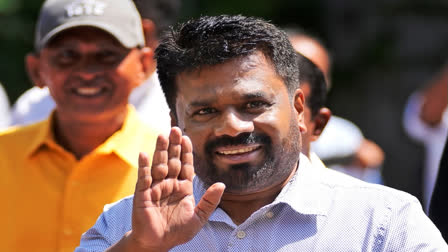New Delhi:Anura Kumara Dissanayake of the National People’s Power (NPP) alliance took oath as the new president of Sri Lanka in a simple ceremony at the Presidential Secretariat in Colombo on Monday.
Dissanayake received over 5.7 million votes or 42.3 percent of the total votes leading his nearest rival Sajith Premadasa of the Samagi Jana Balawegaya (SJB) by over a million votes. Incumbent President Ranil Wickremesinghe, who was running as an independent candidate, was at a distant third having received just around 2.3 million votes or 17.3 percent of the total votes.
Though a veteran politician, 55-year-old Dissanayake, popularly known as AKD, became the President of the Indian Ocean island nation for the first time.
Dissanayake was born on November 24, 1968, in the village of Thambuthegama in the Anuradhapura District, North Central Province, Sri Lanka. His father was a labourer and his mother was a housewife. Dissanayake received his education at the Thambuthegama Gamini Maha Vidyalaya and the Thambuthegama Central College, becoming the first student from the college to gain university entrance.
He issanayake joined the Janatha Vimukthi Peramuna or (JVP), a Marxist-Leninist party of Sri Lanka, in 1987, becoming active in student politics. He engaged in full-time political activities from 1987, with the onset of the 1987–1989 JVP insurrection. He entered the University of Peradeniya and left a few months later due to threats. He transferred to the University of Kelaniya a year later in 1992 and graduated in 1995 with a Bachelor of Science in physical science.
He joined the JVP politburo in 1995. He was first elected to Parliament in 2000 as a member of the JVP and has been a vocal critic of corruption, economic mismanagement, and the political establishment since then. His speeches often focus on the struggles of the working class, the rural poor, and the need for systemic reforms in Sri Lanka’s economic and political structures.
In 2004, the JVP allied with the Sri Lanka Freedom Party (SLFP), contesting as a part of the United People’s Freedom Alliance (UPFA) in the 2004 parliamentary elections and winning 39 seats in the parliament. Dissanayake was elected to parliament from the Kurunegala District from the UPFA and was appointed by then President Chandrika Kumaranatunga as Minister of Agriculture, Livestock, Land and Irrigation in the joint SLFP–JVP government in February 2004.
He resigned his ministerial portfolio on June 16, 2005, with the other JVP ministers, following JVP leader Somawansa Amerasinghe’s decision to quit the United People’s Freedom Alliance in opposition to President Kumaranatunga government’s controversial joint mechanism with the LTTE for tsunami relief coordination in the North and East provinces. He served as Chief Opposition Whip from September 2015 to December 2018.
Dissanayake took over the leadership of the JVP after the death of Amarasinghe, the former leader, due to a heart attack in 2014. Under Dissanayake’s leadership, the JVP shifted further towards democratic socialism, focusing on issues like good governance, human rights, anti-corruption, and poverty alleviation.
In 2019, Dissanayake formed the NPP, a socialist and social democratic political alliance in Sri Lanka. It consists of the JVP and several other Left-leaning political parties, trade unions, civil society organisations, and individuals who share a vision for a more egalitarian Sri Lanka. The NPP’s primary aim is to present a credible alternative to the two main political parties in Sri Lanka - the Sri Lanka Podujana Peramuna (SLPP) and the United National Party (UNP).
Dissanayake is known for his fiery speeches in parliament, where he regularly takes on the government over issues such as corruption, human rights violations, and economic mismanagement. He has been a key voice in criticising the nepotism and family-based politics that have long dominated Sri Lankan governance. His ability to speak directly to the concerns of ordinary Sri Lankans has made him a popular figure among the youth and working-class voters.
